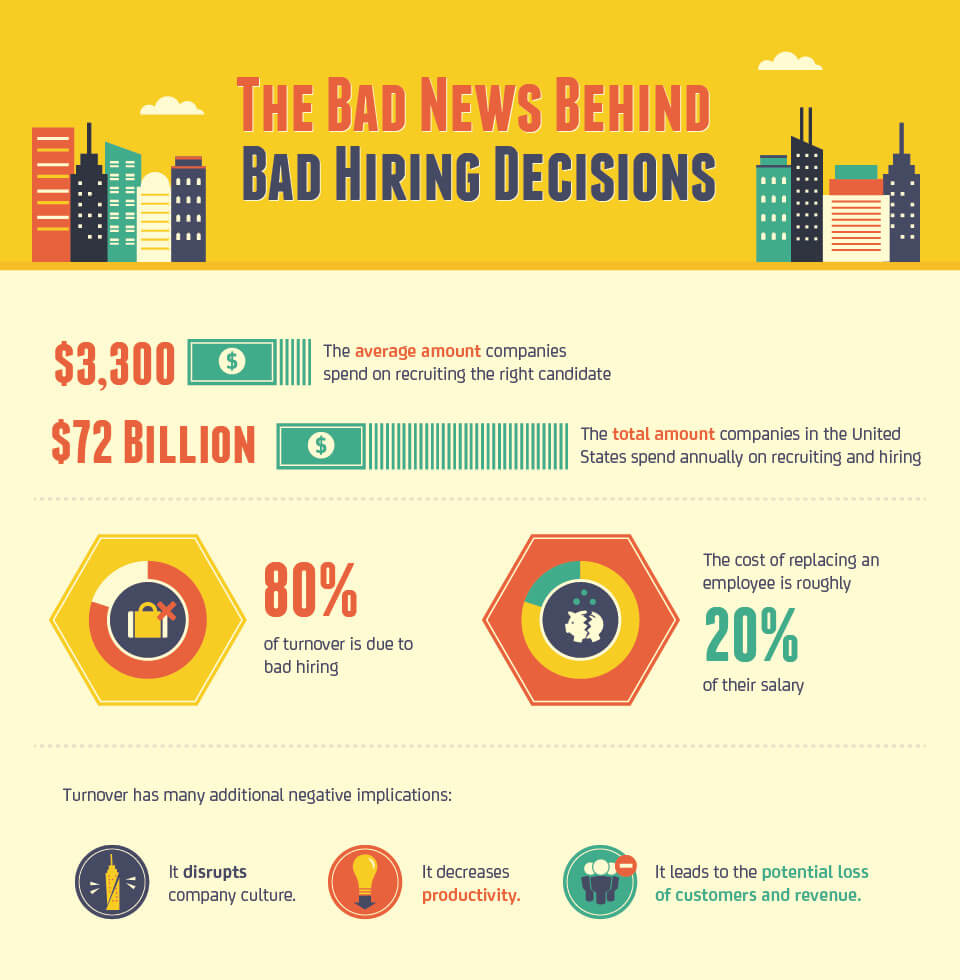Others
How to Conduct A Job Interview Effectively: A Pocket Guide
Article written by Mathew Maniyamkott
Regular contributor to various magazines. Passionate about entrepreneurship, startups, marketing, and productivity.
13 min read
19 September 2025

Unlike the old days, the average tenure of an employee today takes less time than a college degree. There are thousands of resumes floating around in the inboxes of HRs, and with the number of options available for skilled workers, employers have their job cut out for them. That’s why it’s important to conduct a job interview effectively.
In such a scenario, hiring mistakes can cost you more money than you realize.

What is the cost of a wrong hire?
- Even if the person has the right skill set, if they are not up to the mark when it comes to being a team player, it can adversely affect the morale of the rest of your team.
- When you hire someone who isn’t the right fit, you are not only staring at a wasted salary, there is much more to it. The time of the interviewer is down the drain.
- You need to start the whole process of taking interviews again. There are instances where hundreds of candidates are interviewed for one role. Imagine having to go through the entire process again.
- You end up wasting a lot of time in the training process where there are other employees who get to do this role.
- All of this adds to the cost to the company. The cost of a bad hire can, the worst case, exceed the annual salary that you offer for the position.
How to conduct a job interview: 20 steps to know
Here is a complete guide on how to conduct a job interview and consequently improve your hiring technique. Dive in!
1. Prepare for the interview
Before you get to conduct a job interview, ensure that you are qualified to be an interviewer.
You need to consider the role that you are taking the interview for and find out the kind of education, skill sets, temperament, and experience that you require. Analyze these requirements and prepare your interview questions accordingly.
Decide on the most important questions that will display their intelligence and work-ethic to you. Try asking questions based on behavioral and situational situations.
2. Ask questions
Sure, the entire premise of an interview is asking questions, but that’s not our point. Ask them open-ended questions. You could use questions like the ones below:
- “Tell us about your career trajectory so far?”
- “Why do you think you are qualified to take up this job?”
- “In a (insert a work-related scenario) situation, how would you react? What will be the steps that you take to minimize the damage?”
- “We would love to know some of the highlights of your career?”
- “What is the kind of direction that you need to get your work done?”
Depending on the acumen of the candidates, their answers will vary. You will be able to understand a lot about the communication and technical skills of the candidate when you listen to them.
3. Culture fit
If there is one mistake that most hiring managers are guilty of committing, it is the fact that they are not checking for culture-fit.
If your company’s culture is extremely open, then you might not find someone who isn’t a team player as a valuable addition to the company.
In an atmosphere like this, not only will this particular candidate find it difficult to thrive, but also others will feel suffocated around this person because their values are different.
4. Compatibility
Compatibility is a close cousin to culture-fit. You need to look beyond the obvious to find out how compatible the candidate would be working at the company.
- Are they looking to get things done only in one particular manner?
- Are they open to criticism?
- Would they be willing to learn new skill sets within a period of time?
- How fast would they be able to get their work done?
- Do they like being told everything or can they take agency of what is required?
- How do they react when they know they have messed up?
While this might not necessarily have much to do with their skill sets, it tells a lot about the person. It will help you figure out if they are consistent with their values and will be able to enjoy the working atmosphere in the office.
If they are not a culture fit and they are not compatible with the nature of the office, then they will feel out of place and will not be able to give their best. It is a lose-lose situation for everyone involved.
In a different atmosphere, the candidate might be the best bet, but for you, it is not working out and you need to acknowledge that before making the hire.
5. Describe the company to the candidate
The above two points can be met from the candidate’s side only when you tell them how the company operates.
Give the candidate a brief background about the position, a rundown of the skill sets expected from someone who will be joining for the role, and so on. Set clear objectives for the candidate’s job role and help them walk through it.
Understand how the company works and make sure that the candidate understands how the company functions. Ensure that they get to know as much as possible about the company because they need to form an opinion too and see if they are a culture-fit or not.
6. Ask work-related questions
Once both of you are comfortable with each other after exchanging pleasantries, it is time to ask questions related to the kind of role you are interviewing for.
Ask your candidate about their previous experience, how it helped them become good at what they do, which are their strong areas, and what kind of projects they have worked on previously.
Even before you meet the candidate, it is a must that you have questions prepared in advance. The questions should not be randomly asked.
There should be a structure so that you can identify their skills in individual subjects.
While the candidate is answering, you will be able to find out their level of confidence, how clearly they answer, and the reasoning that they offer for each point.
7. Ask follow-up questions
Getting more information from the candidate on a particular topic is important. If you ask a topic called A, they might only be giving you a broad answer to it.
Once you ask a follow-up question based on their answer for ‘A’, you will be able to truly understand the depth of their knowledge.
They cannot claim to know something and not answer them properly when you ask a follow-up question.
While following a strict set of questions is important, you also need to use their answers as a guide so that you are in a position to gauge how good they are at what they do.
8. Give the candidate the opportunity to ask questions
Do remember that the interviewee aka the candidate is also assessing the company during the conversation. They also want to know if they would be the right fit for the company.
They will be assessing your level of intelligence, attitude, and the way you are asking questions.
If they find you rude or condescending, that is the impression they will have about the company. You might lose out on a good employee if you don’t give the candidates the respect they deserve.
Reply to their answers with respect, and composure. Encourage them to ask any number of questions. You will also be able to find out their confidence and intelligence based on the kind of questions they ask.
9. Assess their desire to work at your company
If you find that the candidate has no clue about the company, what it does, its competitors, market position, its products, etc., it means that the candidate is not serious about what you do.
You need to find out how excited they are to be a part of the organization. While not all companies will elicit that kind of emotion, you can still find out what they think about your company based on their answers.
10. Ask them how they would like to work
The best employer is someone who gives a free hand to its employees while ensuring that no one slacks. Ask the candidate how they would like to go about their daily jobs.
Make them paint a picture of how they imagine an attractive workplace. You will be able to find out how committed or excited they are about working and the kind of style they have for working.
11. Let the interview wander a bit
If you are looking to interview candidates to hire for top positions, then it is imperative that you let the interview go astray, at least for a bit.
When the interview strays, you are not controlling the conversation and you are letting it take its natural course. Out of nervousness, the candidate may end up saying things that they never would have.
This technique will only work when the position you are hiring for is at a senior managerial level. You don’t want to try this technique for every other role, you will only end up wasting a lot of time.
It is much better to stick to the set of questions when interviewing for entry-level positions.
12. Be confrontational
This piece of advice completely goes against what we have been saying until now and common sense, right? True.
But to conduct a job interview for a role that requires a lot of patience and temperament, you need to be able to assess their ability to handle emotional stress too.
By being able to understand what sets them off, you will be in a good position to see if they will be a cultural fit and suited to the pressures that are associated with the particular job role.
13. Probe deeper
Whenever they ask you something, make it a point to probe a bit deep on that subject. Sometimes, you will never be able to guess if a candidate is lying or not. Only by asking more questions would you be able to put a finger on that.
Be curious to know about the candidate and keep fielding them more questions so that you get to understand them on a deeper level.
14. Be objective
It is your responsibility as the interviewer to be as objective as possible when it comes to the interview. You cannot include your personal biases or idiosyncrasies in the interview.
It will only derail the entire process and can prove to be detrimental for everyone involved. While you should not ignore your gut instincts, do not rely on them alone as it might be your personal biases taking over.
15. Get specific details
While you conduct a job interview, ask for specific questions that might involve an experience only they would have. There are times when people are trying to impress interviewers by saying things that they might not have done.
Get numbers, specific details, dates, sales numbers, conversion rates, etc. If they had come up with numbers on the spot, they will not be able to recall it later if you ask about it to them again during the interview.
16. Ask fact-based/hypothetical questions
You might also want to ask the candidate a lot of fact-based questions. This is just to clarify information that is already listed on the candidate’s profile. Also, ask why they are interested to work in this particular job role and what made them jump into this career.
Use the interview to ask hypothetical questions where you put them in situations and ask them how they will handle the situation. A lot of people would be able to handle this easily, but there are some who will not be up to the task.
17. No personal questions, please
You should not ask personal questions that would make the interviewee uncomfortable. In fact, you can be sued if you ask certain questions. For example, you cannot ask the candidate if they are planning on having children.
As a good recruiter, refrain from anything that pushes the emotional buttons for the candidate. Stay away from such questions as much as possible. You don’t want to lose your job for interviewing a candidate, do you?
18. Do not hire “mini-mes”
Many interviewers are known to find affinity to candidates who are more like them. While this is a personal bias, it is a tad more difficult to identify it.
By doing so, the interviewer misses out on the most suitable candidates while hiring someone who may not always be the best fit for the company.
You will also be missing out on diversity and not building a team that comes with a different set of skill sets.
19. Discard ‘noise’
It is the prospect of interviewers magnifying irrelevant information that might not actually be of importance for their job role at all.
If you find that the candidate is not smooth in his/her conversations, but has exceptional coding abilities, then if you are hiring for the position of a developer, then you can overlook their ability to converse.
But if the same speech impediment is present for a candidate who is looking for a sales role, then it can affect their job performance. You might want to hire someone who can sound great for the clients.
20. Provide the next steps
At the end of the interview, tell the candidate what they can expect in the coming few days. If they have any other interview lined up with your company, then let them know when they can expect it.
After the process, give the interviewee a chance to ask if they have any questions. On the other hand, you can do the same too. Ensure that they don’t have any doubts about how the company works or about the role once the interview is over.
Conclusion
To conduct a job interview, you need skill, preparation, and above all, patience.
Have you wondered why interviews are still a crucial part of hiring? Interviews are a perfect way to assess the candidate face-to-face. Getting it wrong can be detrimental to the prospects of the company. It will result in a lot of time, effort, and money going down the drain.
If your recruitment process is not in line with your company’s goals, then you need to get it sorted before you conduct a job interview. Ensure that you keep reviewing your hiring policies every few months so that you use the latest software while also finding the right hires. Software like SurveySparrow help you develop a high performing work culture at all stages of the employee cycle from recruitment and pre-hire to exit. You can create a free account to explore all of its features.
14-day free trial • Cancel Anytime • No Credit Card Required • No Strings Attached

Thousands of brands trust SurveySparrow to turn feedback into growth. Try it free today!
Mathew Maniyamkott
Guest Blogger at SurveySparrow
Related Articles

Others
10 Types of Charts: Data Insights with Visualizations
19 MINUTES
4 January 2024

Others
Top 12 Monday.com Integrations to Automate Your Workflows
14 MINUTES
3 November 2021

Others
Crunchy Leaves and Frosty Winds... Hello, Mr. November!
3 MINUTES
9 November 2018

Others
Want to Expand Your Business Outreach? Here’s How (in 5 Steps)!
6 MINUTES
5 February 2026
